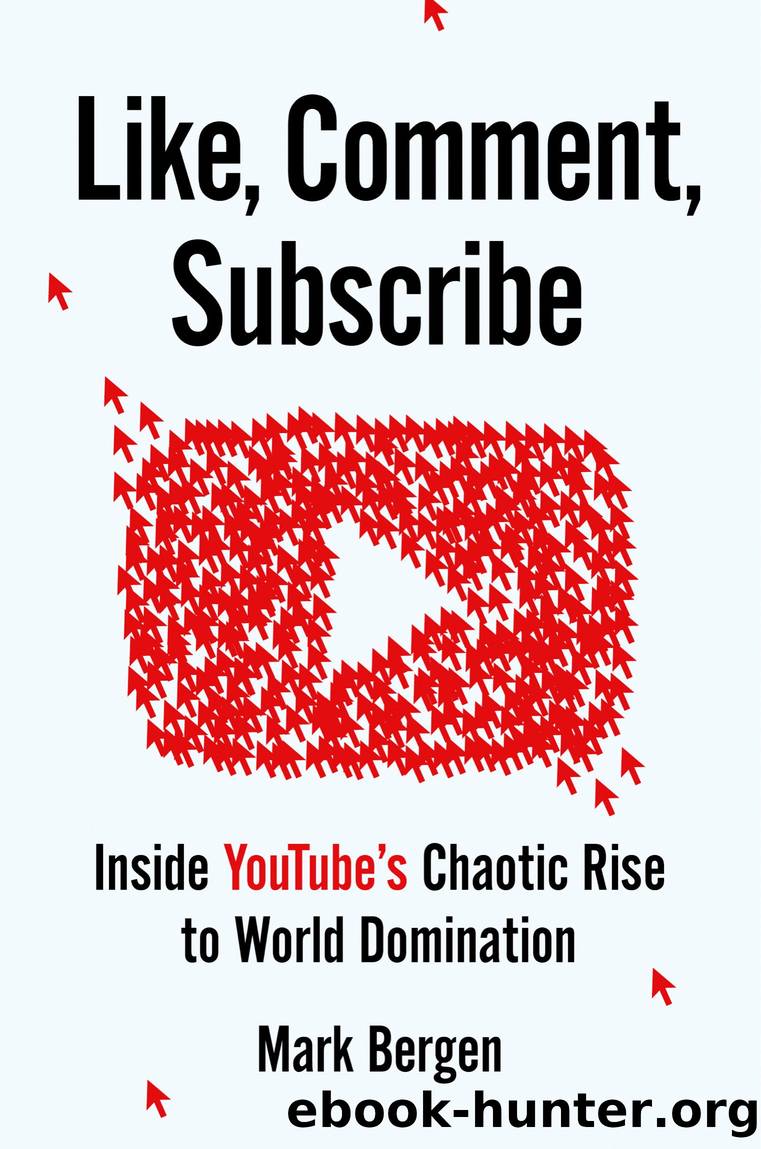Like, Comment, Subscribe by Mark Bergen

Author:Mark Bergen [Bergen, Mark]
Language: eng
Format: epub
Publisher: Penguin Publishing Group
Published: 2022-09-06T00:00:00+00:00
* * *
⢠⢠â¢
The company knew something was askew with its creator economy. But it had another corporate hubbub to deal with.
That August in 2015, Larry Page had shocked the world (and most Googlers) by announcing the creation of Alphabet, a new holding company that would split his empire into several stand-alone businesses: one for Google, one for self-driving cars, one for smart thermostats, and so on. YouTube seemed like a natural splinter; it already operated with a different name and office. Leaders there considered plans to become a separate Alphabet unit, detached from Google. Wojcicki wanted to keep reporting to Page, who had appointed himself Alphabet CEO, rather than his successor at Google, Sundar Pichai. But ultimately it was decided YouTube was too intertwined with Googleâs business and machinery to leave. So it stayed at Google.
That year Wojcicki had also brought on two new executives to shape YouTubeâs future. Neither had a background in media production, but they were both Google veterans. Neal Mohan had cut YouTubeâs first big ad deal, in its office above the pizza shop, as a director at DoubleClick, and he had stayed with Googleâs ad division after the DoubleClick acquisition. He had two Stanford degrees, an NBA obsession, and the careful elocution of an accountant. Within Google he was known as a political master, someone who could âmanage up.â One YouTube director recalled having a tense standoff with Wojcicki during a Tuesday meeting. By Thursday, Wojcicki had changed her mind. Mohan âhad done some Jedi mind trick behind the scenes,â the director recalled. This paid off. A publication reported in 2011 that Google had given Mohan a $100 million bonus to counter an offer from Twitter. Some Google colleagues then ribbed Mohan as the âhundred-million-dollar man,â much to his chagrin.
Wojcicki put Mohan in charge of YouTubeâs product, and he quickly became her top deputy. As his deputy, Mohan recruited Ariel Bardin, the executive fond of Viceâa fast-talking, blunt Israeli who had been at Google since 2004, most recently running its payments service. When he and Mohan arrived, they looked at figures in the creator economy and saw serious inequities. Most ad money flowed to the top one hundred creators. What if a few of them went elsewhere or quit producing? Was the compensation system really a level playing field? The new executives developed a plan to redraw YouTubeâs entire payment system based on mathematical measures of success. They called this Project Beane after Billy Beane, the unorthodox baseball general manager featured in Moneyball.
They had another nickname for the project: âboil the ocean,â a nod to the Herculean engineering task required. YouTube had used this phrase before to describe big, successful efforts to remake its service for apps and TVs. So as 2016 began, the company prepared to solve the financial problems of its creator class with engineering, like usual. It didnât seem like there were other major problems on the horizon.
Download
This site does not store any files on its server. We only index and link to content provided by other sites. Please contact the content providers to delete copyright contents if any and email us, we'll remove relevant links or contents immediately.
Harry Potter and the Goblet Of Fire by J.K. Rowling(3025)
Never by Ken Follett(2873)
Shadow of Night by Deborah Harkness(2710)
Ogilvy on Advertising by David Ogilvy(2678)
Zero to IPO: Over $1 Trillion of Actionable Advice from the World's Most Successful Entrepreneurs by Frederic Kerrest(2376)
The Man Who Died Twice by Richard Osman(2290)
Machine Learning at Scale with H2O by Gregory Keys | David Whiting(2267)
Book of Life by Deborah Harkness(2259)
How Proust Can Change Your Life by Alain De Botton(2256)
My Brilliant Friend by Elena Ferrante(2218)
0041152001443424520 .pdf by Unknown(2214)
The Tipping Point by Malcolm Gladwell(2201)
How to Pay Zero Taxes, 2018 by Jeff A. Schnepper(2095)
Will by Will Smith(2033)
Purple Hibiscus by Chimamanda Ngozi Adichie(1978)
Hooked: A Dark, Contemporary Romance (Never After Series) by Emily McIntire(1932)
Borders by unknow(1780)
Rationality by Steven Pinker(1761)
Daughter of Smoke and Bone by Laini Taylor(1738)
